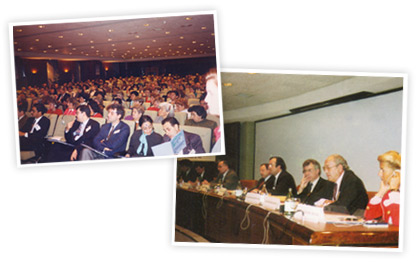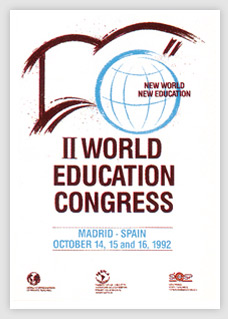| World Confederation of Education - COMED |
| Madrid, Spain - 1992 |
HISTORICAL ABSTRACT
II WORLD CONGRESS ON EDUCATION (1992)
"New World, New Education"
With the motto "New World, New Education," this highly significant meeting for private education was held in Madrid from October 14th to 16th, 1992. The attendance of delegates from 20 countries from five continents, the presence of qualified lecturers -Victor Ordonez, Deputy Director of UNESCO for Basic Education and Juan Carlos Tedesco, Director of UNESCO Education International Office in Geneve- the sponsorship of Ministries of Education from 30 countries and the extraordinary support of the Spanish government, contributed to the transcendence of this event which was shaped in the conclusions and agreements born through this activity.
CONCLUSIONS OF THE II WORLD CONGRESS ON EDUCATION: Madrid Decalogue
In the city of Madrid -capital of the Nation that produced one of the most important cultural gests of History 500 years ago- we, representatives of the continental organizations, members of the World Confederation of Education (COMED), submit the following conclusions for the consideration of those National States, schools all over the world and all men on the earth for whom freedom constitutes the essence of their original dignity:
1. The Fifth Centennial of the Discovery of the New World has illuminated the reflections shared during these days. Therefore, we think that a New World will be conformed only by means of a New Education based on the cooperation among the countries.
2. If 500 years ago two apparently antagonistic worlds were able to complement and enrich each other conforming a new identity, today it seems absolutely regressive to feed false antagonisms between the world of education proposed by the states and the world of education proposed by the societies. This Centennial of the Meeting of two Worlds coincides, therefore, with the Meeting of two areas of Education: Public and Private.
3. On the one hand, the XX Century has been a witness to important efforts made in order to extend free access to education to all men all over the world; on the other hand, the XXI Century claims for the permanent improvement on education. Only quality on education will guarantee Man´s True Freedom.
4. The members of COMED consider the different evidences coming from underdevelopment as a serious obstacle for the realization of each human being and emphasize that the most dramatic underdevelopment comes from the denial of human potential generated as a consequence of lack of education.
5. Testimonies gathered during these days by means of experiences and the situation undergone by free education in every continent allow the assertion that there exists a worldwide trend in favor of non-authoritarian open educational systems which can guarantee the right of families to choose their own educational pattern.
6. Experiences in the field of financing presented by the recent Central and Eastern European democracies, such as the Swedish System of School Cheque, show encouraging perspectives to assure the concept of authentic democracy and educative freedom.
7. We do emphasize our certainty that education is the global answer that can solve the great problems suffered by men. Thus, we do ask responsible officers from different States to give priority to the permanent increase of funds assigned to education.
8. The widespread preoccupation on the quality of the education given and its results, will find a solution only if trustworthy mechanisms allowing the systematic evaluation of results in all levels of schooling -from kindergarten to university- are promoted. The systems for school accreditation and institutional self-evaluation have shown significant improvements in this way; therefore it should be very useful to take them into consideration.
9. Organizations members of COMED repeat their permanent cooperation for the improvement of quality of education in the world. So that we propose:
a. To act as an integrating organism to encourage the associative movement of private education
centers all over the world.
b. To extend its cooperation to national and international, public and private educational entities.
c. To intensify the concept of "free educational enterprise" as a way of progress that generates educational competition.
d. To defend the right of institutions to create their own educational offer as a proof of free and
qualified teaching and ask National States for legislation to guarantee and extend the competitive private education offer to complement the public one.
e. To prompt educative proposals that being conveniently debated, can be defended in every international forum.
f. To exchange experiences and technologies contributing to enrich the educational offer in
each country.
g. To promote the cultural cooperation among all populations in the world, respecting their
own identities.
h. To encourage the exchange of teachers and students in the different countries for better integration.
i. To encourage programs of institutional qualification to update and enrich the teaching practice.
j. To guarantee the principles of freedom, justice and cooperation and promote the ethical and democratic values among people and populations.
10. Finally, at the doors of the 21st. Century, when human beings are facing new and profound questions coming from the scientific and technological development, such as the changes in geopolitical and social structures, the preoccupation for education problems in its axiological, cultural, economic, quantitative and qualitative aspects, there seems to be a light of hope for the improvement of mankind.

AUTHORITIES PRESENT
• Juan Carlos Tedesco
• Eduardo Carbó
• Edgardo Néstor De Vincenzi
• Perpetuo Lentijo
• Mark Henning - South Africa
• Kartalli Moraitti - Greece
• Matei Cerkez - Romania
• Juan Manuel Moreno García - Spain
• Matus Kucera - Slovakia
• Claude Duval - France
• Woyciech Starzynski - Polond

Advertisement of the Congress
"Thus, we, representatives of more than 15.000 private schools from all over the world, with more than 7.000.000 students, members of COMED, do affirm our compromise as educators to work for a more humanistic, democratic, qualified, active and engaged school by a process of transformation towards the new century.